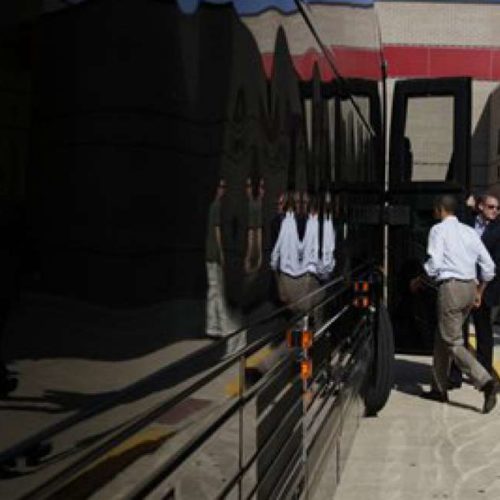Introduction
Q: Was President Obama’s tour bus made in Canada?
A: The shell of the $1.1 million bus came from Canada, but it was converted for the Secret Service by a company in Tennessee.
Full Question
There have been several articles lately decrying the Obama administration because the Secret Service allegedly purchased tour buses from Canada. I’ve also read in a couple of places that this is not entirely true. Would you please set the record straight? Also, could you address past precedent for presidents using tour buses while campaigning in office?
Full Answer
President Barack Obama went on a bus tour through Iowa, Minnesota and Illinois last week to talk about jobs. “I want to sell goods all over the world that are stamped with three words: ‘Made in America,’ ” Obama told a crowd in Iowa. Critics pounced, calling Obama hypocritical for talking about fighting for American jobs while riding around in a lavish new bus made in Canada. The claim became fodder for late night talk show comedians and conservative pundits, such as Fox News’ Sean Hannity, who ridiculed Obama for “touting job creation” while riding around in “a bus built in Canada.” The New York Post wrote about it in a story that ran under the headline, “Canucklehead Obama Bus-ted!”
Republican presidential candidate Rick Perry also took a jab at Obama’s bus during a campaign stop in Florence, S.C., on Aug. 19.
“The president’s been on a jobs tour,” Texas Gov. Perry said. “As a matter of fact, we kinda crossed — we didn’t cross paths, but we were in the same state together, Iowa. He had his big old bus, his big old $1.2 million bus — made in Canada.”
Here’s the story on the bus. It was one of two custom buses ordered by the Secret Service in July 2010 from Hemphill Brothers Coach Company in Whites Creek, Tenn., at a total cost of nearly $2.2 million, according to Secret Service spokesman George Ogilvie and purchasing documents.The shell of the bus was, in fact, procured from a Canadian company, Prevost, a Quebec-based firm that specializes in the manufacturing of bus shells for the high-end conversion market (think pop stars, corporate buses, etc.). Although the buses were purchased from an American company, the Secret Service was aware the shell came from Canada, Ogilvie told us. In fact, the contract with Hemphill filed in the Federal Procurement Data System lists “Canada” as the “country of product origin.”
The bus was then “converted” by Hemphill to meet the unique specifications required by the Secret Service. Ogilvie said the buses were purchased from a sole-source provider (no-bid), because of the “requirement that we’d be able to support the weight of security and communications enhancements.” At the time of the contract, he said, it was believed to be the only vehicle that had the payload capacity to meet the Secret Service’s needs.
Both buses — a “long overdue” addition to the Secret Service’s protective fleet — will be offered to others eligible for Secret Service protection, including the eventual Republican nominee for president, Ogilvie said. In the past, the Secret Service leased buses used by presidents and others, fitted them with specialized equipment, and then removed the equipment afterward.
So how much of the new bus used by Obama last week is American and how much is Canadian?
Hemphill officials aren’t talking. And Michael Power, director of communications for Prevost, told us confidentiality agreements prevented him from discussing the specific bus shells purchased by the Secret Service. But in general, he said, the conversion process typically makes up anywhere from half to two-thirds of the end cost, depending on what the users want to do with the bus. And in this case, the conversion was performed by an American company. In other words, one could say it’s a Canadian-American bus.
– Robert Farley
Read more in Accountability
Accountability
VIDEO: ‘Bobble Head Brown’ ad
Accountability
State Dept. spends terrorism and emergency dollars on parties, rented linens and a kitchen
Auditors question uses and oversight of special fund meant for crises, evacuations from Egypt and Libya, and other ‘extraordinary’ needs

Join the conversation
Show Comments